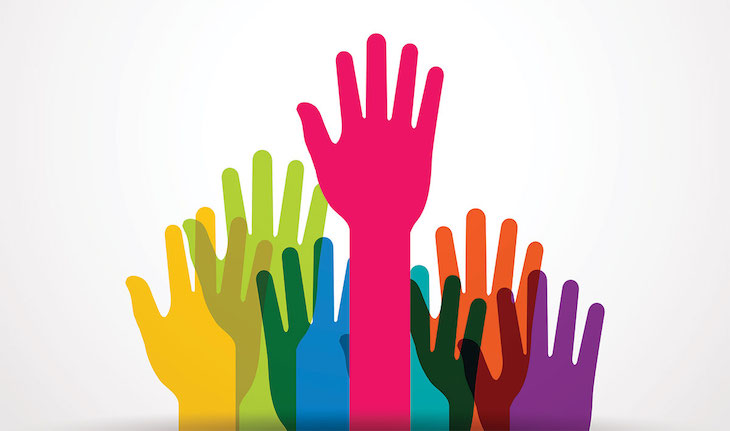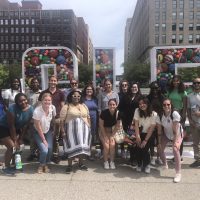Every 10 years, the U.S. Census Bureau conducts a headcount of everyone living in our country. This information paints the picture of our nation and influences important decisions such as congressional representation and the distribution of federal funding. With the lowest response rate of large cities, only 46.9% of Cleveland households have responded to the census this year. Certain census tracts in our region have even lower response rates, such as Downtown (29%) or Kinsman (28%). To help bolster response rates, particularly in our hard-to-count neighborhoods, the Greater Cleveland Coalition is pleased to invite community partners to submit a proposal for rapid response funding to support census mobilization or organizing efforts in neighborhoods and localities in Cuyahoga, Lake and Geauga counties with a low self-response rate.
Read on to learn how to apply for a grant or download the RFP here.
Overview
The George Gund Foundation, The Char and Chuck Fowler Family Foundation, The Saint Luke’s Foundation and the Cleveland Foundation in partnership with the Ohio Census Advocacy Coalition, have worked to get out the count in the Greater Cleveland region through micro-grants, an organizing and mobilizing effort. The coalition of partners has awarded $153,000 in micro-grants to 50 grantees thus far. The grants have supported local, community-based organizations that advance the work of the 2020 census with populations identified to be at risk of an undercount in Cuyahoga, Lake and Geauga counties. Hard to count (HTC) populations include five primary groups: 1) immigrants/newcomers, 2) African Americans, 3) Latinx, 4) children under five and their families, and 5) students, renters and people who are transient.
The ban on public gatherings and the closure of “trusted spaces” due to the COVID-19 pandemic forced census grantee partners to shift their work and find new ways of conducting outreach. Trusted voices evolved to become social media influencers. Zoom town halls and social media became the new virtual trusted spaces. As this work continues, it will be critical to provide funding to partners who are conducting digital outreach, are comfortable with both traditional as well as non-traditional organizing techniques, and are trusted by communities that have a low census self-response rate.
The extension of the census timeline from July to October has created an additional unforeseeable burden on our census partners’ capacity. More importantly, our local response rates are sobering, as they are below expectations. Currently, the city of Cleveland self-response rate is 46.9%, making Cleveland last out of cities with 300,000+ people. The coalition seeks to build momentum in areas with low self-response rates. The effort to boost the self-response rate will involve a targeted approach for the third and fourth round of micro-grants.
Grant Opportunity
The Cleveland Foundation is administering and distributing grant funding to support local, community-based organizations in getting out the census count in Northeast Ohio. Micro-grants ranging from $1,000- $5,000 will be awarded to groups conducting outreach activities in neighborhoods with low self-response rates based on data provided by the U.S. Census Bureau as of July 13, 2020. A low self-response is defined as a neighborhood or census tract with a lower self-response rate than the City of Cleveland. A third and fourth round of grantmaking will occur on an expedited timeline to quickly deploy resources.
Below is information about the eligibility criteria, timeline, funded activities, selection criteria, and the application process. For questions about the micro-grants, please contact Juan Galeano, Project Consultant, at jgaleano@clevefdn.org
Eligibility Criteria
Eligible applicants must:
- Operate in the City of Cleveland and/or Cuyahoga, Lake and Geauga County
- Be an incorporated 501(c)(3) nonprofit organization
- Agree to let the Cleveland Foundation share their application with other local foundations for the purposes of scoring and fundraising
- Be located or serve residents in a neighborhood/census tract that has a low self-response rate on the census as of 7/13/20. Grantees will be selected based on the level of trust they hold within communities and data provided by the census.
Timeline
July 13, 2020: Cleveland Census Rapid Response Fund RFP released
July 27, 2020: Third-round proposals due
Aug. 7, 2020: Third-round grant decisions announced
Aug. 7- Oct 31, 2020: Third-round grant period
Aug. 10, 2020: Fourth-round proposals due
Aug. 21, 2020: Fourth-round grant decisions announced
Aug. 22- Oct. 31, 2020: Fourth-round grant period
Funded Activities
Funded activities should be targeted to neighborhoods with a low self-response rate. Examples of promising activities include, but are not limited to:
- Digital organizing strategies (i.e. virtual town halls, Facebook live, and geo-targeting through ads)
- Traditional organizing strategies (i.e. phone banking, yard-signs, texting, and caravans)
- Distributing census materials at meal distribution sites
- PSAs and ads that encourage people to fill out the census
- Activating trusted spaces in a way that respects physical distancing
Grantee Selection Criteria
For the third round of micro-grants, organizations should propose a scope of work that aims to achieve the objectives outlined above. Partners with the capacity to conduct digital, traditional, and non-traditional organizing will have the best chance of being funded. Applicants are encouraged to identify a hard-to-count population and an outreach strategy that focuses on neighborhoods and areas with a low self-response rate. Specific selection criteria includes:
Community Engagement
- Understanding and having relationships with residents in a neighborhood or census tract that has a low self-response rate
- Track record of engaging residents on the 2020 census
- Capacity to conduct traditional, non-traditional, and digital organizing to get out the count
- Creative and practical outreach strategy that respects physical distancing and has a high likelihood of success
Implementation
- Participate in monthly Zoom community of practice town halls with other grantees to share lessons learned
- Report on progress to local and regional partners, including writing a brief report at the end of grant period about your activities and impact
- Selection criteria for the fourth round of micro-grants may be modified based on updated response rate data and continuing efforts to understand the types of outreach strategies that are working to increase response rates. If any changes are made, an updated application will be sent out electronically in accordance with the timeframe outlined above.
Application Process
Please address the following in a proposal of about two pages, and email the document to jgaleano@clevefdn.org with the title “Census 2020 (insert organization name)” by the designated deadline.
- Name of the organization submitting the application, mission statement, and contact information for key staff
- Describe the community/neighborhood/census tract that you seek to conduct your outreach in, and your relationship with the people there
- A summary of 2020 census outreach and activities to date
- Capacity to conduct digital, traditional, and non-traditional organizing
- Proposed use of funds, including:
- The major outreach strategies that will be utilized to encourage participation/ counting of the hard to count in targeted neighborhoods
- A description of key partners in the outreach effort
About the Greater Cleveland Census Coalition
The George Gund Foundation, The Char and Chuck Fowler Family Foundation, The Saint Luke’s Foundation, The Cleveland Foundation, New Venture Fund, and two members of the Ohio Census Advocacy Coalition (OCAC) – Cleveland VOTES and the Children’s Defense Fund-Ohio are partnering to offer micro-grant funding to support local, community-based organizations that advance the work of the 2020 census with populations identified to be at risk of an undercount in Cuyahoga, Lake and Geauga counties. To date, 50 Northeast Ohio organizations shared $153,000 in two rounds of grantmaking. For questions about the micro-grants, please contact Juan Galeano, Project Consultant, at jgaleano@clevefdn.org.




Hello,
Is it too late to apply for a census grant for my organization?
Thank You,
Delores Gray
Black on Black Crime inc.
Hi Delores,
Thank you for visiting our blog! While the census micro grant opportunity has closed, there are still resources and support available to promote a complete count in our community. We suggest you reach out to Cleveland VOTES for additional support: info@clevotes.com or 216.202.5468. You can also visit http://www.completecountcle.org every Friday for updates.